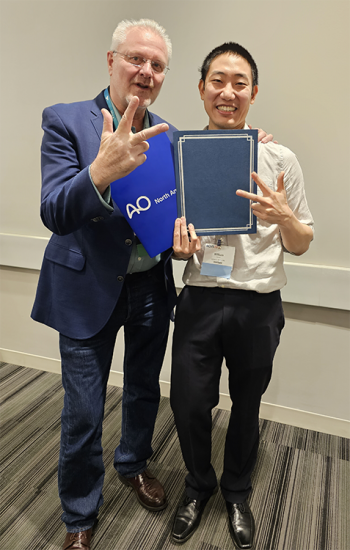
Dr. William Chung, a surgical resident at the MSU Veterinary Medical Center with a special interest in bioengineering research, received three awards at this year’s American College of Veterinary Surgery’s Surgery Summit in Louisville, Kentucky.
Chung earned first place in both the Outstanding Surgery Residents’ Awards and the American and European Colleges of Veterinary Surgery (ACVS and ECVS) Resident Speaker Exchange Program Awards in the Small Animal Residents’ Forum Research Presentations category for his presentation, “Mechanical Comparison of Straight and Pre-Bent Interlocking Nails Used for the Stabilization of Tibial Fracture.” For his ACVS/ECVS award, Chung will present his research again at the next ECVS meeting in July 2024 in Valencia, Spain.
In addition, Chung was awarded one of only two One AO Awards presented by AO VET North America for the same presentation, which he will share again at an AO meeting in April of next year. The awards are given based on the project’s cross-disciplinary orthopedic relevance and embodiment of the One Medicine spirit of AO North America, a unique organization that brings together physicians and veterinary experts in the fields of trauma, craniomaxillofacial, spinal, and veterinary orthopedic surgery.
"It is an honor to receive recognition from the ACVS, the ECVS, and the AO Foundation,” shares Chung. “I am very thankful to be given the opportunity to share the results of our study. More importantly, this gives us the opportunity to present our research findings to a broad audience and to further advance our collective knowledge in veterinary orthopedics. I would also like to thank Dr. Loïc Déjardin for his unwavering support and mentorship over the past four years, as well as the support from the MSU College of Veterinary Medicine’s Endowed Research Funds."

Dr. Loïc Déjardin, W. O. Brinker Endowed Chair of Veterinary Surgery, professor, and head of Small Animal Orthopedic Surgery at the MSU Veterinary Medical Center, serves as mentor during Chung’s research associateship and residency at MSU. He notes the significance of Chung’s achievements, as well as the multifaceted value of Chung’s work. “These are the most prestigious awards offered at the ACVS—according to a past ACVS chair of the Board of Regents, this is the first time that this perfect trifecta has been achieved in the history of the ACVS. I am immensely proud of Will’s accomplishments, as they consolidate and further advance MSU’s position at the forefront of orthopedics. Beyond the scientific merit of Will’s work, it has major clinical and educational implications.”
Dr. Srinand Sreevatsan, associate dean of Research and Graduate Studies at the MSU College of Veterinary Medicine, agrees. “These clinical and translational accomplishments attest to the impacts of endowed research funding at the College on enhancing animal health and wellbeing.”
Chung’s study, “Comparison of Straight and Pre-Bent Interlocking Nails Used for the Stabilization of Tibial Fracture,” represents one of the many aspects of the comprehensive and ongoing I-Loc interlocking nail program, started by Déjardin in 2003. This new technique, developed by Déjardin 15 years ago, then implemented at MSU with Drs. Laurent Guiot and Reunan Guillou, uses the US-patented I-Loc Nail (US 9,072,553 – B2) to virtually eliminate complications associated with conventional (straight) tibial nail osteosynthesis. This technique, wich is also used for revision surgery of failed tibial osteosynthesis with straight nail or plates, has been taught worldwide for the past 10 years.
Chung’s work was funded by the College’s endowed research funds (ERF) and BioMedtrix (a Movora Brand) who donated the nails used in the study. The ERF grants support research that will have a significant impact on animal health and well-being. In addition, ERF-funded projects help foster strong, collaborative research that will contribute to development of a clinician-scientist program and strengthen existing clinical and diagnostic capabilities at the College through resident and graduate student training.
